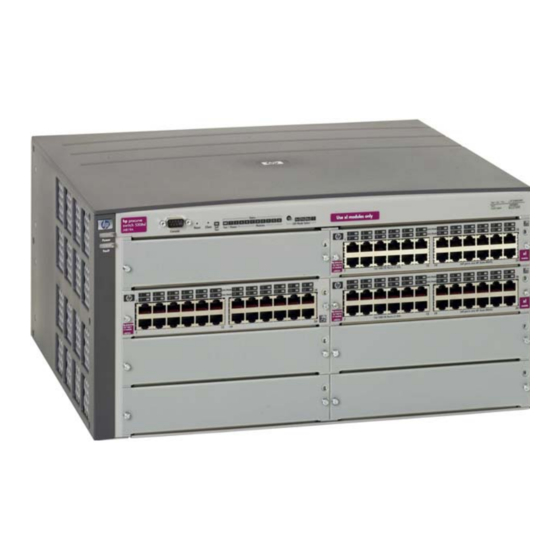HP ProCurve 5304xl Manual do revisor - Página 13
Procurar online ou descarregar pdf Manual do revisor para Interruptor HP ProCurve 5304xl. HP ProCurve 5304xl 35 páginas. Procurve 5300xl series
Também para HP ProCurve 5304xl: Especificações (4 páginas)

2.2.3 F-Chip
The fabric, or F-Chip, which is located on the backplane of the switch, provides the crossbar fabric for
interconnecting the modules together. The use of a crossbar allows wire speed connections
simultaneously from any module to any other module. As mentioned in the N-Chip section, the
connection between the F-Chip and each N-Chip (module) in the chassis is through a 9.6Gbps full
duplex link.
One unique function of the F-Chip is to automatically replicate multicast packets and send them to the
destination modules. This method is more efficient than having the source N-Chip do the replication.
Since only a single copy of the multicast packet needs to be sent to the F-Chip, this method saves
bandwidth on the high speed connection between the source N-Chip and the F-Chip.
2.2.4 The Master CPU
Along with the F-Chip, the backplane of the switch also contains the master CPU, 32MB RAM and
12MB of flash ROM memory. The master CPU, a 200 MHz Power PC 8240, runs the routing protocols
and maintains the master routing tables, maintains the master MIBs, responds to SNMP requests, and
manages the user interfaces. The Master CPU is also responsible for switch bootup coordination. Two
copies of the switch operating system can be stored in the flash ROM. This allows the user to recover
quickly if the main code copy is corrupted or a code update produces results other than what is
desired.
Input to the CPU is prioritized into 4 queues. Queuing this way prevents the user from being locked out
of the switch user interface due to unintentional high levels of traffic, such as broadcast storms. More
significantly, this also prevents a user lockout due to intentionally high levels of traffic, such as denial
of service attacks.
2.3 High Availability
2.3.1 IP Routing
IP routing on the HP ProCurve Switch 5300xl Series is done in the ASIC at wire speed by the user
defining VLANs and then specifying routing between them. Some of the IP services available are:
•
Routing Services
•
RIP (version 1, version 1 compatible version 2, and version 2)
•
Split Horizon and Poison Reverse supported
•
Redistribution - importing of static and connected routes into the RIP route table. Restrict command
available to prevent route advertising in and/or out of any port. Useful for security (routed
sections of the network can be made invisible to the rest of the network.)
•
Up to 128 routed interfaces. Since RIP sends out its full routing table on each routed interface once
every 30 seconds, care should be taken to limit the number of interfaces used for larger routed
environments. If the number of routes needed is greater than 1,000 with a higher number of
routed interfaces, for instance, greater than 32, then OSPF should be considered as the routing
protocol of choice, as it is more efficient in handling larger routed environments.
•
OSPF (RFC 1583 (default) and 2328 compliant)
•
Redistribution – importing of static and connected routes into the OSPF route table. Restrict
command available to prevent route advertising in and/or out of any port. Useful for security
(routed sections of the network can be made invisible to the rest of the network.)
•
OSPF traps (RFC 1850)
•
OSPF Route Authentication – uses plain text passwords or MD5 encryption. The MD5 keys are time
sensitive – the 5300 must have the correct time/date set, particularly after a reboot. It is
recommended that when using OSPF route authentication TimeP or SNTP (time setting protocols)
be used to assure a proper time/date setting, particularly on reboot caused by a power failure.
•
128 routing interfaces (interfaces that participate in the routing protocols) per chassis
© Hewlett-Packard Co. 2002, 2003
HP ProCurve Switch 5300xl Series Reviewer's Guide
Rev 1.1 – 2/11/2003
http://www.hp.com/go/hpprocurve
Page 13 of 35
